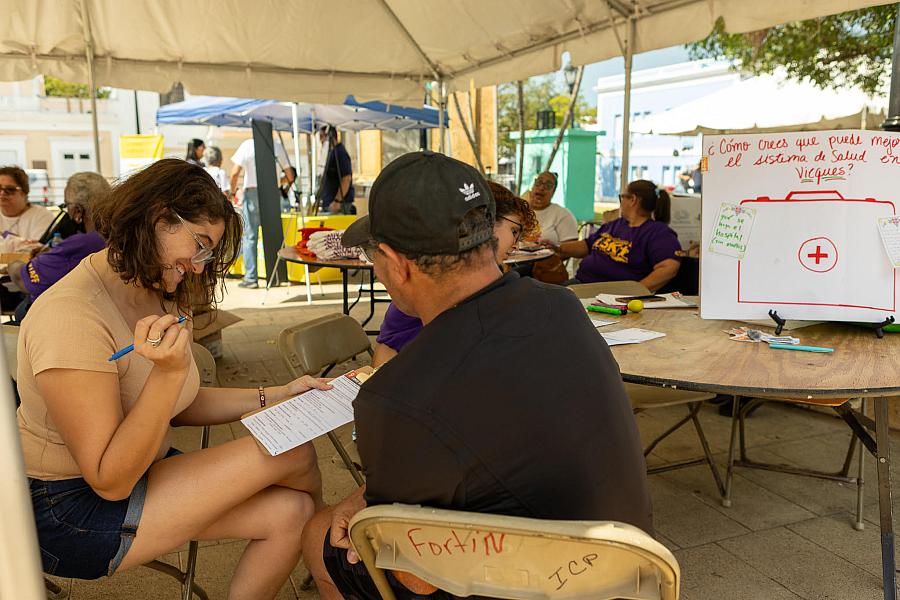How we built trust with underserved communities in Puerto Rico

Camille Padilla Dalmau conducts a survey in Vieques as part of a
broader community engagement effort to listen to the community’s health needs and
interests.
(Courtesy photo)
On the morning of February 17, the multi-purpose center in Vieques was transformed into a clinic offering information and consultations with dermatologists and gastroenterologists. A trailer that said Hospital Oncologico Sobre Ruedas (Oncology Hospital on Wheels) was administering mammograms. The seats at the waiting area inside the center were completely full, so people were waiting under tarps outside.
While reporting on Vieques, my colleagues and I learned that it had the second-highest age- adjusted cancer mortality rate in Puerto Rico. Because of its geographic location, an island town east of Puerto Rico’s mainland, oncological treatments and diagnostics are a boat ride away. Having these services and specialists was a rare opportunity that residents of all ages took advantage of.
The clinic was part of the Vieques Arepa Festival, a celebration that raises funds for Vieques en Rescate, or VER. This organization has been helping cancer patients with the cost of transportation and medical bills for 11 years, as we recounted in our article “Amid lack of services, this organization is supporting cancer patients in Vieques.”
I first heard of the organization while visiting Vieques in 2023 as part of 9 Millones’ pilot community outreach. After doing listening sessions, we began offering workshops that led to us identify the community’s interest in investigating health equity.
It can be intimidating to cover a community that has been overpromised and underdelivered, that has a history of militarization, and inadequate press coverage. It is a community that doesn’t trust outsiders easily. We have slowly built a relationship with the community by focusing on listening, and honing relationships with community leaders that could later serve as introductions to more people.
My time as a grantee of the Center for Health Journalism’s Impact Fund for Reporting on Health Equity and Health Systems showed us how to expand those relationships though surveys, so we could get perspectives beyond those of the people we interviewed.
While people waited under the tarps scrolling on their phones or talking with each other, 9 Millones’ editor Laura M. Quintero and I asked if they would like to fill out a survey named “What is your experience with health care in Vieques?” We also set up a table next to where people were registering for a 5K event and buying merch from the festival. One of the questions from the survey: “How do you think the medical system in Vieques can improve?” Aside from the in-person events, we sent a WhatsApp message to people in the community and got a total of 99 respondents.
A majority of respondents (80%) classified the Vieques health system as “poor” and 53% said that they feel the health care system has gotten worse in the last 20 years. To the open-ended question about how the system could be improved; a majority (51%) called for basic access to doctors and treatment. The Susana Centeno Diagnostic and Treatment Center (CDT), often referred to as Vieques’ hospital, closed After Hurricane María in 2017. That structure was demolished in 2022 and is currently being reconstructed for $88.5 million. Some 17% of respondents said that the hospital construction would improve the health care system. This reflects what we heard on the ground, many people say they are worried that the area will end up with a big structure that cannot sustain itself or attract medical providers.
My advice to journalists that want to focus on community engagement for their reporting projects is to start by cultivating long-term relationships. It’s impossible to build trust if you only show up to a community when you need something. I’ve been visiting Vieques since 2021 and sometimes the visits aren’t to report but rather simply get to know people and organizations and build relationships. This has led to better reporting and allowed me to find stories I wouldn’t have otherwise.
Another important engagement lesson we learned is the importance of integrating ourselves into events that are already happening, as opposed to creating something new. This guarantees that people will show-up. It also informs people that you know their community. In case of doing surveys, it helped to be at a place where people were waiting or simply enjoying the festival, without being in a hurry.
Finally, following up is just as important as showing up. After our article was published, we held a panel discussion with community members and a government official. We were able to share our findings to members of the community and moderate a conversation where residents shared their concerns and the government official could respond. It’s a rare occasion in Puerto Rico to have this kind of dialogue, since citizen participation is not widely promoted.
Addressing the concerns that the hospital would not be able to financially sustain itself, the auxiliary secretary of the Department of Health said the government had a plan for a budget to cover medical costs for the next 10 years.
Audience members asked to see that plan and for more community participation in the process of assessing the health needs of Vieques. The Department of Health representative claimed that the last version of that plan was sent by another government agency.
We committed to request the information from the government agency in question.
It takes a lot of time, energy and effort to do community outreach. But because of our efforts to follow-up and get feedback, I feel confident that the community trusts us and our work.

